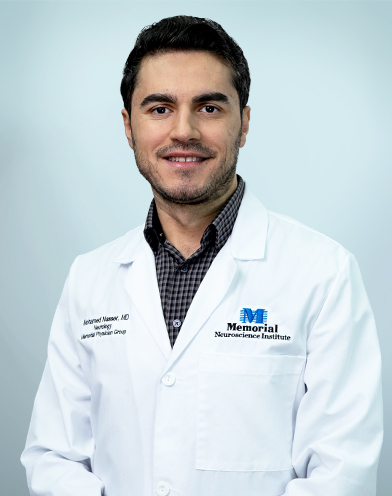
Epilepsy and Seizures
As a Level 4 Epilepsy Center, we provide skilled, compassionate care for adults with epilepsy.
Leaders in Epilepsy Care
 Our Epilepsy Center has received Level 4 (the highest level) accreditation from the National Association of Epilepsy Centers (NAEC). This distinction demonstrates the expertise of our epileptologists and neurosurgeons and our commitment to providing the most advanced epilepsy treatments available today.
Our Epilepsy Center has received Level 4 (the highest level) accreditation from the National Association of Epilepsy Centers (NAEC). This distinction demonstrates the expertise of our epileptologists and neurosurgeons and our commitment to providing the most advanced epilepsy treatments available today.
Learn more about our accredited Epilepsy Center and what sets us apart.
What Is Epilepsy?
Epilepsy is a brain disorder that affects millions of people in the U.S. The main symptom of epilepsy is repeated seizures. During a seizure, nerve cells in the brain produce surges of electrical activity. People may experience sudden changes in movement, behavior and sensations.
Epilepsy can start at any age, but new diagnoses are most common in early childhood and between ages 40 and 50. In general, physicians diagnose epilepsy if you’ve had at least two seizures that aren’t linked to a known medical condition.
At Memorial Neuroscience Institute, our epileptologists treat adult patients. An epileptologist is a neurologist who specializes in epilepsy. Children with epilepsy receive care from our pediatric neurology team at Joe DiMaggio Children’s Hospital. Find out more about pediatric epilepsy.
Types of Seizures
There are many kinds of seizures. In general, doctors group them into two main categories based on where they begin in the brain:
Focal seizures begin in a specific location in the brain. There are two types of focal seizures:
- Focal onset awareness seizures: You remain aware of what’s happening. Symptoms may include unusual emotions, sensations or movements.
- Focal onset impaired awareness seizures: You lose awareness or consciousness and may stare into space. Involuntary repetitive movements (automatisms) such as blinking, clapping and lip-smacking are also common.
These seizures begin in nerve cells on both sides of the brain. There are several types of generalized seizures:
- Absence seizures: Cause blank staring and loss of awareness and may include repetitive movements
- Atonic seizures: Involve a loss of muscle tone and may cause drooping eyelids or falling down
- Clonic seizures: Produce jerking muscle movements
- Tonic seizures: Cause muscles to become stiff
- Tonic-clonic seizures: Include tonic and clonic features that cause severe convulsions and a loss of consciousness
- Myoclonic seizures: Cause brief muscle twitches or jerks that usually last only a few seconds
What Causes Epilepsy?
About half of epilepsy cases have no clear cause. For others, known causes include:
- Autoimmune disorders, in which your immune system attacks your brain cells
- Brain infections, such as meningitis, encephalitis, neurocysticercosis and human immunodeficiency virus (HIV)
- Genetic conditions that are inherited or occur during fetal development
- Head injuries due to motor vehicle accidents, falls or other incidents
- Metabolic diseases that affect how your body breaks down and uses nutrients in food
- Neurological disorders, such as stroke, brain tumors, arteriovenous malformations (AVMs) and dementia
Epilepsy Triggers
Some people with epilepsy have certain factors that trigger their seizures. Stress and sleep problems are common triggers. Other potential triggers include:
- Certain foods, beverages or caffeine
- Drinking alcohol, alcohol withdrawal or drug use
- Flashing lights or other visual stimulation
- Hormone changes, such as during the menstrual cycle
- Illness, with or without fever
- Medications
- Poor diet or dehydration
- Time of day
Our neurologists recommend tracking your seizures and the situations surrounding each. This written log can help you identify your triggers and develop strategies to avoid them.
Diagnosing Epilepsy
Diagnosing epilepsy is often challenging but essential. Treatment strategies vary depending on the epilepsy type. Seeing an epilepsy specialist can help pinpoint a diagnosis.
Our epileptologists review your symptoms, medical history and family history. We may also ask those close to you to describe your seizures. Diagnostic tests are typically part of the evaluation and may include:
A neurological exam is a group of tests to find out how well your brain and nervous system are working. The tests evaluate:
- Involuntary processes, such as breathing, heart rate and digestion
- Muscle reflexes, balance and coordination
- Senses, such as touch, hearing, smell and vision
- Thinking and memory
CT and MRI scans can identify problems in the brain that could be causing seizures, such as infections, tumors or blood vessel diseases. At Memorial Healthcare System, we have access to the latest imaging equipment, including 3T MRI. Advanced technology provides clearer pictures and better identification of brain abnormalities.
EEG is a painless, noninvasive test to measure brain electrical activity. We place small metal disks (electrodes) on your scalp to detect electrical activity. Thin wires carry the information to a computer monitoring system.
You may have an EEG in the office as part of your neurological exam. If the results are inconclusive, we may recommend EEG monitoring in our epilepsy monitoring unit. This unit features sophisticated equipment run by certified EEG technologists. You’ll also find a comfortable environment for you and your family.
We observe you around the clock for several days. Our epileptologists study this information to establish a diagnosis and create a treatment plan.
Refractory (drug-resistant) epilepsy occurs when medication therapies don’t control seizures. In this case, we may use advanced tests to provide more information. These tests are usually the first step to determine whether you might benefit from epilepsy surgery. Tests may include:
- Imaging: Detailed imaging, such as functional MRI, PET and SPECT scans, helps us assess and map brain function.
- Stereotactic EEG (sEEG): This test involves placing thin wire electrodes deep in your brain using minimally invasive surgery. We rely on image guidance and a robotic arm to insert the electrodes precisely through incisions only a few millimeters wide. After we place the electrodes, you spend time in our epilepsy monitoring unit to record your brain activity.




It matters to you. It matters to us.
Quality and Safety Data for Memorial Healthcare System's Neuroscience Institute
Our goal is to provide our patients with the information they need to make informed choices for themselves and their families.
View Quality and SafetyYou have a right to know about pricing
We want to give you the information you need to make important healthcare decisions.
View PricingMyChart Portal
View test results, schedule follow-up appointments, request prescription refills and more.
Login or Sign-up to MyChart
Patient- and Family-Centered Care
We treat patients and family members as partners in healthcare.









